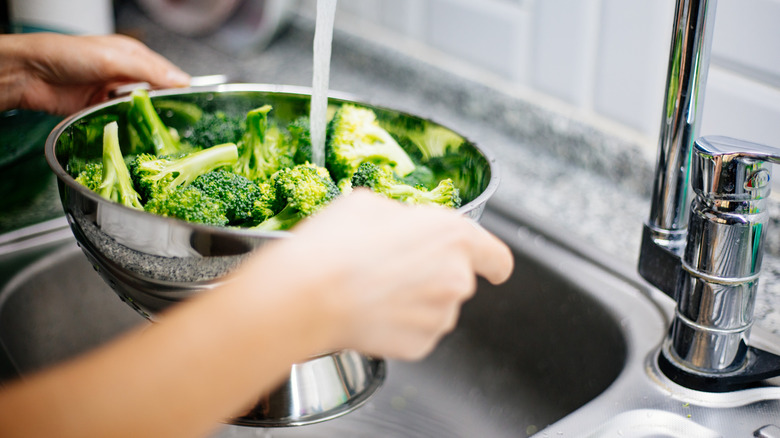How To Remove A Broccoli Smell From Your Kitchen
We're always told to eat more greens, but sometimes cooking broccoli just isn't worth that lingering smell in the kitchen for days after. The reason for that less-than-pleasing aroma is that sulfur is released when broccoli's natural enzymes break down as it cooks. And the time cooking actually correlates with the smell, so the longer you steam, fry, or boil your broccoli, the stronger that smell becomes. Those sulfur compounds are clingy, to say the least; they get absorbed into fabrics, curtains, blinds, and even into the walls.
To keep enjoying broccoli without stinking out your home, cook broccoli right after chopping instead of letting it sit on the counter. Then, steam, fry, or blanch it just until tender (overcooking is where things start to go wrong in terms of smell but also nutrition). Acid can help, so add in a splash of lemon juice or vinegar while it's cooking to neutralize some of those odor compounds before they escape into the air. If you boiled or blanched your broccoli, it's also important to pour out the cooking water as soon as the broccoli is ready and rinse the pot well.
If all else fails, a citrus simmer pot could sort you out. A simmer pot is actually Joanna Gaines' old-fashioned way to keep a home smelling fresh — by simmering citrus peels and cloves in a small pot of water, you replace that classic funky cruciferous smell with something far more bright and inviting.
Other ways to tackle lingering aroma
If, after trying all the above tips, that broccoli smell still refuses to budge, then try setting out bowls of baking soda, activated charcoal, or even coffee grounds, which act like tiny sponges that absorb odor molecules from the air over time. You can keep these bowls out near the stove when cooking and replace them every couple of days. And of course, good airflow is always important to keeping your home fresh. Crack open a window before you start cooking broccoli (if not, certainly after) and use that hood vent — it's what it's there for.
For a deeper kitchen clean, focus on the spots most people overlook, which include the walls, backsplashes, and range hoods where cooking residue can cling, but be wary of the things to avoid when cleaning your kitchen walls to make sure you clean them without damage. And appliances deserve attention as well — microwaves, ovens, and dishwashers can all trap smells from cooking cruciferous vegetables, especially if the vent filter hasn't been cleaned in a while or food residue builds up. Give them a good scrub with a baking soda paste, then leave the doors open so moisture can evaporate. And if this feels like an ongoing issue, it might be time to look into some more tips and tricks to deodorize a smelly kitchen — because as tasty as broccoli can be, no one wants their home smelling like it after dinner is over.

